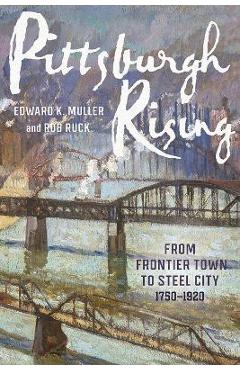Pittsburgh Rising: From Frontier Town to Steel City, 1750-1920 - Edward K. Muller

Detalii Pittsburgh Rising: From Frontier Town
libris.ro
161.82 Lei
179.8 Lei
History
Edward K. Muller
Pittsburgh Rising: From Frontier Town - Disponibil la libris.ro
Pe YEO găsești Pittsburgh Rising: From Frontier Town de la Edward K. Muller, în categoria History.
Indiferent de nevoile tale, Pittsburgh Rising: From Frontier Town to Steel City, 1750-1920 - Edward K. Muller din categoria History îți poate aduce un echilibru perfect între calitate și preț, cu avantaje practice și moderne.
Preț: 161.82 Lei
Caracteristicile produsului Pittsburgh Rising: From Frontier Town
Comandă Pittsburgh Rising: From Frontier Town Online, Simplu și Rapid
Prin intermediul platformei YEO, poți comanda Pittsburgh Rising: From Frontier Town de la libris.ro rapid și în siguranță. Bucură-te de o experiență de cumpărături online optimizată și descoperă cele mai bune oferte actualizate constant.
Descriere magazin:
Over 170 years, Pittsburgh rose from remote outpost to industrial powerhouse. With the formation of the United States, the frontier town located at the confluence of three rivers grew into the linchpin for trade and migration between established eastern cities and the growing settlements of the Ohio Valley. Resources, geography, innovation, and personalities led to successful glass, iron, and eventually steel operations. As Pittsburgh blossomed into one of the largest cities in the country and became a center of industry, it generated great wealth for industrial and banking leaders. But immigrants and African American migrants, who labored under insecure, poorly paid, and dangerous conditions, did not share in the rewards of growth. Pittsburgh Rising traces the lives of individuals and families who lived and worked in this early industrial city, jammed into unhealthy housing in overcrowded neighborhoods near the mills. Although workers organized labor unions to improve conditions and charitable groups and reform organizations, often helmed by women, mitigated some of the deplorable conditions, authors Muller and Ruck show that divides along class, religious, ethnic, and racial lines weakened the efforts to improve the inequalities of early twentieth-century Pittsburgh--and persist today.

Produse asemănătoare
Produse marca Edward K. Muller

Pittsburgh Rising: From Frontier Town to Steel City, 1750-1920 - Edward K. Muller
![]() libris.ro
libris.ro
Actualizat in 08/04/2025
161.82 Lei